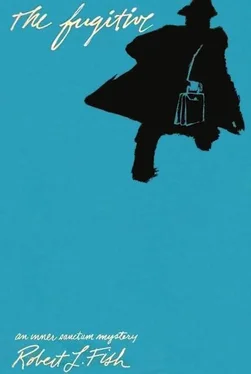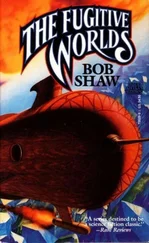Once clear of the entrance, he swung the wheel sharply to the left and went bouncing over the center strip, coming down heavily over the curb to enter the uptown side of the tunnel with his superchargers roaring. He was fortunate in facing but one lone car hurrying home to Copacabana; this fled to one side with lights flashing and horn echoing hollowly in the enclosed space. Da Silva kept to one side, shooting through the narrow tunnel with his hand pressed steadily on the horn, his foot madly flickering the floor switch for his headlights.
At the exit of the tunnel he slowed momentarily as he bumped back across the center strip to his own lane. He cast one quick glance back at the steaming wreck piled across the mouth of the tunnel and then, without hesitation, swung once again in the direction of the city, stamping on the gas pedal.
But the road ahead was clear. The fog here had lifted enough to see the glaring cyclop eye winking down impersonally from each light pole; they illuminated a deserted pavement. With a vicious muttered curse, Da Silva tightened his grip on the steering wheel, increasing his speed. But he knew with a sinking feeling, even as he shot past the empty shining sea wall and the silent dripping palms, that he had lost his quarry.
Within the leading Packard Ari attempted to relax at Mathais’ side; his fingers drummed tensely on the center armrest that had been drawn down to form a comfortable barrier between the two men. There had been no conversation. The fear that had been gnawing relentlessly at Ari for the past few days seemed to mount in the heavy air of the closed car; his hands were damp with perspiration. It seemed incredible to him that the other should not be able to sense his fear, to feel it, almost to smell it; but Mathais sat looking through the rolled-up window with seemingly complete unconcern. It will go away, Ari thought desperately; this will go away. It is only because I am finally going to meet the head of their organization; it is only nervousness; because we are coming to the final moment; it is only natural. Despite the coolness of the night his forehead was beaded with tiny drops of sweat; his heart began its old pounding rhythm, the irregular beat adding to his fright. The old feeling of nausea returned, and he desperately wished for a window to be opened, wondering if he might possibly request it without his fear becoming visible for all to see. He wished he had taken a pill before leaving, and suddenly wondered if he were about to turn his great adventure into farce by becoming sick.
They left the beach and turned north toward the tunnel leading to the city. With the car windows closed, the sound of their tires was reduced to a faint purr on the damp roadway; there seemed to be something sinister in the smooth manner in which they appeared to float through the foggy night, as if they rode in some hideous bubble that seemed to shrink, getting smaller and smaller every moment. Maybe it is only another form of my old dream, Ari thought, swallowing forcefully, my old nightmare from Tier 3, Row 4, Barracks 4; the frightening dream of being suffocated, clamped down upon, stifled. He drew in a deep breath, freeing his lungs shudderingly, and forced himself to lean back, attempting calmness.
The tunnel swallowed them; the hum of the tires subtly changed tone. Mathais seemed to suddenly acquire a certain air of tenseness. As the car rolled smoothly beneath the glinting battery of fluorescent lights, he sat straighter, as if quietly awaiting something. Now the tires were sucking the roadway with their old whine; the arched mouth of the tunnel had spewed them out once again into the night. And then, behind them, Ari heard the dampened protest of brakes, the muffled, tortured screaming of metal rasping angrily against concrete, and then the final pounding crash. Their driver did not falter but drove smoothly on. Ari turned his head swiftly, staring back through the tiny rear window, but their car had competently swerved away from the main roadway, and the tunnel was now hidden. In the shimmering reflections cast waveringly up from the wet pavement, he could see the second Packard hurrying to catch up with them, swaying slightly on the uneven street. He turned back to see Mathais once again relaxing in his seat, his huge blocks of teeth shining white in a satisfied smile.
“An overly curious cab driver,” said the hotel manager unctuously. “I had noticed him parked a bit above the hotel when we left; he started to follow us.” His voice hardened; there was something familiar about the hardness, something remembered from the past. “That one will bother us no more!”
It was his shocked recognition of the tone of voice that swept all fear from Ari, and with the fear, all of the nervousness and tenseness. He could physically feel these emotions drain away to be replaced with implacable anger and firm resolution. This was the voice he had never forgotten, the voice that he could never forget. This was the voice that represented all he had ever hated and fought against, the voice from which he had suffered and endured such deep losses.
This was the voice of the Storm Trooper, beating his aged and bearded prisoner through the streets; the voice of the camp clerk sneeringly calling out the names of the next batch to leave the frightful insecurity of the vermin-ridden shelves for the terrible certainty of the gas ovens. This was the high, piercing, righteous voice of the Hitler Jugend calmly denouncing their parents to the Gestapo; the voice of the Führer demanding the wave of the future and receiving the shrill “Sieg heil!” of the screaming mob. This was the voice of the Third Reich fifteen years after the cleansing flames of the Berlin bunkers; but the voice of Nazi Germany intact, and Ari knew it well.
He settled back in his seat in sudden relaxation, his blue eyes turning icy. It was this voice and all voices like it that he could help still by his meeting tonight. The opportunity he had feared, he now welcomed. He nodded stiffly to Mathais as if in praise for the neatness displayed in eliminating their pursuer, and then turned his face once again to the window to avoid the other’s smirk.
They were in a part of the city he did not know. In the fog it was difficult to recognize landmarks, but the street along which they drove, and the facades of the buildings which they passed, did not look familiar. This was a section he had not previously visited. Before them a wall suddenly loomed, topped by a string of lights glistening through the fog. They turned to the right without slowing, and continued driving.
“Yacht Club,” Mathais said briefly, and also turned his attention to the thickening night outside. The Yacht Club faded into the darkness behind them, the car began to slow down. Another curve and a second cluster of lights began to approach. This I should know, Ari thought. It is not so far from the drive; I should be able to orient myself. He shrugged in indifference; it was really quite unimportant.
The Packard eased to the hidden curb; Mathais got down heavily and helped Ari to get out. The fog here was thicker, a pocket that had swirled down into the depression formed by two huge rocky towers. Certainly I should know this place, Ari mused with a touch of irritation. Have I lost my sense of direction altogether? He shrugged again as they walked toward the light cluster; the driver and his silent companion bracketed the two as they went. The sound of the second car pulling up could be heard; a car door slammed and the other feet walked hurriedly up behind them. They arrived at the source of the lights in a tight group. Ari stared in amazement.
Before him was a boxlike car, resembling a short street trolley, but hung from a set of oily wheels mounted clumsily above. He swung his eyes up; the heavy cables passed in a sagging dip over his head and faded in a rising curve into the wall of fog. He turned to Mathais, who was smiling, unable to hide his pride in his arrangements.
Читать дальше












